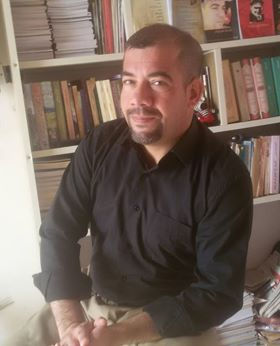Kirkuk: Kurdish Jerusalem
- Farman Hidait
- May 21, 2018
- 3 min read

Kurdish Fighters by YPG (CC BY 2.0)
The historical facts of Kurdish Kirkuk are like those of Jerusalem, in that the Arabs say that Jerusalem is “ours” just as they claim Kirkuk.
But Kirkuk has been the major city of the Guti, Sumerians, and Assyrians — all ancestors of today’s Kurds. Kirkuk became the capital of the Sharszor region under the Ottoman Empire. Now Kirkuk is the strongest obstacle standing in the way of the Iranian Shiite Crescent.
Kirkuk is an ancient Kurdish city and already had a long history before the establishment of the Iraqi State, and the beginning of Kirkuk oil production by the British-Arab rulers in Iraq. In the modern era, since the founding of Iraq, the rights of Kurds - especially in Kirkuk - should have had the same standing as political Arab nationalism, given the strong Kurdish intellectual and ethnic group identity. But sectarianism in Kirkuk reached its greatest extent during the rule of the Baathists, Saddam Hussein’s party, and it continues under the influence of Shiite Iran.
The ancestors of the Kurds founded Kirkuk long before the oldest Arab migration to Mesopotamia, and certainly before a post-war Iraq that has no history or civilization before its modern “birth.” The Kurds’ origins go back to 7,000 BCE at Jarmo, one of the first human villages to engage in farming and establish houses.
Kurdish history and folklore describes the ancestors of today’s Kurds as consisting of many peoples, including the Kardokhi, Lulubi, Guti, and Hurri among other tribes. Legend relates that the Guti people founded the fortress of Kirkuk/Arabkha during the period of the Assyrian Empire, which became the capital of the Gutian state. The name of Kirkuk comes from the name “Arabkha” or “Arapha” since the time of the Akkadian Empire. These events occurred before recorded Kurdish history and are part of the folklore of the Kurdish people.
The archaeological area and the Tomb of the Three Prophets of the Jews exists in Kirkuk Citadel, built around 880 BCE. The Citadel is said to include the tombs of the Prophets Daniel, Hananiel, Mishael, and Uzair (Azariya) (Daniel 1:6-7). North of Kirkuk is the modern Kurdish capital city of Arbil. When it was the capital of Adiabene, Queen Heleni converted to Judaism and left for Jerusalem (Ed.: Heleni haMalka is mentioned in the Talmud, and is buried in Jerusalem where a modern street honors her memory).
In Muslim times, under Sultan Selim (1470-1520 CE), Kirkuk became the capital for Kirkuk Province, the Sharszor region of the Ottoman Empire. Kirkuk continues to be a point of international conflict - it is one of the richest oil areas and has the longest well in the world and has deep oil reserves. The Babar Karkar (BabaGurgur) oil field was the first discovered back in 1927 and is famous for the Eternal Fire which has been burning in the middle of the field for 2,500 years.
Iran claims Kirkuk, saying the city supports Shia Islam because the majority in Kirkuk are Shiite Turkmen. Turkey claims Kirkuk because of the ethnic Turkmen living there. Sunni Arab militants from ISIS try to claim it, disrupting the city.
But there is no talk about the Kurdish people as the owner of the land and their right to Kirkuk, even though the Kurdish people have no objection to allowing the rights of other nationalities and religions to be exercised freely.
The red line is Kirkuk, the ancient and monumental city and the best area for agriculture and horticulture. It is one of the places where the secrets of cultivation and innovations in raising animals occurred early in human history close to 9,000 years ago. Kirkuk is a cradle of civilization and is now the cradle of resistance to ISIS, despite the failure and frustration of the citizens of Kirkuk and the two civilian forces (Peshmerga).
In the majority of districts the Iraqi army was broken, but the Kurdish people are standing with their weapons in Kirkuk against ISIS. It is critically important to stop ISIS in their steps against the Kurds, and Iran in its attempt to complete the Shiite Crescent against Israel and annex the territory to the Iranian Shiite Muslim empire.

Mr Farman Hidait is an independent journalist currently based in Iraqi Kurdistan. A Kurdish writer, journalist, and poet, he currently lives and works in Kirkuk.
He has worked for over 20 years in newspaper, TV, and radio, having begun his career at age 14 writing for a "children to children" newspaper run by Roj, the first newspaper in the history of the Kurdish press. Mr Hidait has written ten books, as well as articles on political and intellectual analysis. He holds a diploma in business administration and a degree in general psychology.



































Comments